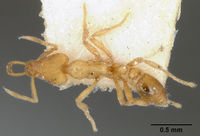Strumigenys uichancoi
| Strumigenys uichancoi | |
|---|---|

| |
| Scientific classification | |
| Kingdom: | Animalia |
| Phylum: | Arthropoda |
| Class: | Insecta |
| Order: | Hymenoptera |
| Family: | Formicidae |
| Subfamily: | Myrmicinae |
| Tribe: | Attini |
| Genus: | Strumigenys |
| Species: | S. uichancoi |
| Binomial name | |
| Strumigenys uichancoi Brown, 1957 | |
Known only from the type material, a worker found in a Philippine fern plant passing through US plant quarantine, Honolulu.
Identification
Bolton (2000) - A member of the signeae complex in the Strumigenys godeffroyi-group. Known only from the holotype, intercepted in quarantine in Hawaii, on a plant that originated in the Philippines. Pilosity on the dorsal alitrunk of the holotype is apparently abraded and some hairs may have been lost. The species appears to be closely related to Strumigenys rofocala and its allies; see comment under that name and also under Strumigenys signeae.
Keys including this Species
Distribution
Distribution based on Regional Taxon Lists
Indo-Australian Region: Philippines (type locality).
Distribution based on AntMaps
Distribution based on AntWeb specimens
Check data from AntWeb
Countries Occupied
| Number of countries occupied by this species based on AntWiki Regional Taxon Lists. In general, fewer countries occupied indicates a narrower range, while more countries indicates a more widespread species. |

|
Estimated Abundance
| Relative abundance based on number of AntMaps records per species (this species within the purple bar). Fewer records (to the left) indicates a less abundant/encountered species while more records (to the right) indicates more abundant/encountered species. |

|
Biology
Castes
Nomenclature
The following information is derived from Barry Bolton's Online Catalogue of the Ants of the World.
- uichancoi. Strumigenys uichancoi Brown, 1957g: 116 (w.) PHILIPPINES. See also: Bolton, 2000: 831.
Unless otherwise noted the text for the remainder of this section is reported from the publication that includes the original description.
Description
Worker
Bolton (2000) - TL 2.1, HL 0.56, HW 0.40, CI 71, ML 0.26, MI 46, SL 0.34, SI 85, PW 0.24, AL 0.56. Characters of signeae complex. Pilosity of dorsolateral margin of head consists of an uninterrupted series of anteriorly curved small hairs; without an apicoscrobal hair and without projecting hairs posterior to level of apex of scrobe. Apical antennomere constricted basally, only narrowly articulated to preapical segment. Cephalic dorsum with elevated short ground-pilosity that gradually increases in length posteriorly, but without obviously longer, stouter standing hairs either at occipital margin or anterior to this. Pronotal humeral hair stiff and minutely looped at the apex. Pronotal dorsum otherwise with a single pair of short erect hairs; mesonotum with 1-2 pairs of similar erect hairs. Pronotal dorsum smooth and shining; mesonotum anteriorly feebly sculptured, posteriorly rather more strongly so. Side of alitrunk with pleurae and propodeum smooth, shining and highly polished. With alitrunk in profile the propodeal teeth depressed, following the line of the propodeal dorsum rather than elevated away from it. Lamella on propodeal declivity broad, its posterior (free) margin straight-edged. With petiole in profile lateral spongiform lobe small, confined to posterior half of node. Disc of postpetiole smooth. First gastral tergite with most standing hairs simple, but some looped apically.
Type Material
Bolton (2000) - Holotype worker, PHILIPPINES: from fern, intercepted by U.S. Plant Quarantine, Honolulu (No. 686 10385) (National Museum of Natural History) [examined].
References
- Bolton, B. 2000. The ant tribe Dacetini. Memoirs of the American Entomological Institute. 65:1-1028. (page 831, redescription of worker)
- Brown, W. L., Jr. 1957h ("1956"). The Indo-Australian species of the ant genus Strumigenys Fr. Smith: Three new Philippine species. Psyche. 63:113-118. (page 116, worker described)
References based on Global Ant Biodiversity Informatics
- Bolton, B. 2000. The Ant Tribe Dacetini. Memoirs of the American Entomological Institute 65
- Brown W. L. Jr. 1957. The Indo-Australian species of the ant genus Strumigenys Fr. Smith: Three new Philippine species. Psyche (Cambridge) 63: 113-118.

